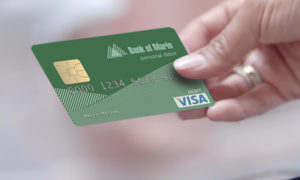Overdraft Protection
Protecting yourself from overdrafts helps you take better control of your finances. Read more:
Standard Overdraft Practices
- Bank of Marin does authorize and pay overdrafts for checks and other transactions associated with your checking account such as automatic or recurring bill payments.
- Bank of Marin does not authorize and pay overdrafts for ATM transactions and everyday debit card transactions. These transactions will be declined if funds are not available.
- Bank of Marin does pay overdrafts at our discretion, which means we do not guarantee that we will always authorize and pay any type of transaction.
- If Bank of Marin does not authorize and pay an overdraft, your transaction will be returned or declined.
- Bank of Marin does charge an overdraft fee of $30 when and item* is paid. There is a limit of 3 overdraft per item fees per day you can be charged for overdrawing your account.
*An “item” is a check, in-person withdrawal, or other electronic means such as an ACH debit.
To avoid Overdraft issues, use our digital banking services to:
- Check the available balance in your account.
- Transfer funds between Bank of Marin accounts.
- Setup account alerts to remind you when your account goes below your set balance threshold.
Overdraft Protection Solutions
Bank of Marin offers two Overdraft Protection Solutions that will ensure you are protected from unplanned overdrafts.
Deficit Funds Transfer
This service will cover checking account overdrafts by automatically transferring available funds from a qualified Bank of Marin deposit account, such as a Savings Account.
Overdraft Credit Link
Bank of Marin’s Overdraft Credit Link provides automatic overdraft protection with a line of credit linked to your personal or business checking account.
Subject to credit approval. See the Overdraft Credit Link Agreement and Disclosure Statement for rates and fees.
How it works:
If you have insufficient funds to cover debits made to your checking account, the needed funds will be automatically transferred into your account from Overdraft Credit Link. Minimum advance is $50.00, up to your available credit limit. The funds will be transferred at the close of business if there is a net deficit in the associated account.
Benefits:
- Avoid unintentional returned checks or rejected debit transactions.
- Avoid unwanted overdraft fees.
- View and pay your principal balance online.
- No set up fee; No maturity date.
- No annual maintenance fee.
- No transfer fees.
Contact your local Bank of Marin branch today to discuss your Overdraft Protection options.
Overdraft Practices – Questions & Answers
How can Bank of Marin’s overdraft solutions help me?
If you make a debit transaction, but do not have enough money in your account, overdraft protection will cover the cost of the transaction up to your available credit limit or funds balance. Bank of Marin offers two solutions to avoid overdrafts, Deficit Funds Transfer and Overdraft Credit Link. To sign up for either of these services, please contact your local Bank of Marin branch.
Are there other ways that I can still overdraw my account?
Yes. Payments made by checks and other transactions using your checking account number, and recurring and automatic bill payments may still overdraw your account. Bank of Marin may continue to provide overdraft services for these types of transactions and charge you an overdraft item fee, up to 3 per day. Bank of Marin pays these overdrafts at our discretion, which means we do not guarantee that we will always authorize and pay any type of transaction. If we do not authorize and pay an overdraft, your transaction will be returned or declined.
What is the difference between single, everyday debit card transactions and recurring debit card transactions?
Single, everyday debit card transactions are one-time purchases you make during your daily spending. This can include one-time transactions at stores, online, or over the phone. Recurring debit card transactions are the regular payments set up with businesses ahead of time using your checking or debit card number and which are authorized for ongoing use. This includes monthly membership fees and bills such as utility and phone bills.


